What do elephants symbolize is a common question regarding these popular animals. Elephant symbolism plays a major role in many eastern religions and cultures, with the Elephant God being worshipped in some countries.
Elephants also symbolize strength, memory, remembrance, and gentle soul in a mammoth body. Let us study elephant symbolism in detail so you can decipher its exact meaning in your life.
Table of contents
- Elephant Symbolism and meaning
- Elephant Native American Symbolism
- Elephant Eastern Symbolism
- Elephant Christianity Symbolism
- Elephant African symbolism
- Elephant Medicine
- Elephant in Dreams
- Elephant Encounters and Omens
- Elephant’ Mythology and Folklore
- Elephant Spirit Animal
- Elephant Totem Animal
- Elephant Power Animal
- Elephant Tattoo Meaning
Elephant symbolism and meaning
Elephants have been around for thousands of years. These massive animals were used in wars and for transport. Mythological tales show us that this wise and loyal animal led lost people in the forest back on the path.
Elephant shaped figurines and art have been seen during the Renaissance period. Elephant symbolism is somewhat complex, for it embraces certain secondary implications of a mythic character.
In the broadest and universal sense, it is a symbol of strength and of the power of the libido. Indian tradition worships the Elephant-headed God, who is the son of the Great Shiva.
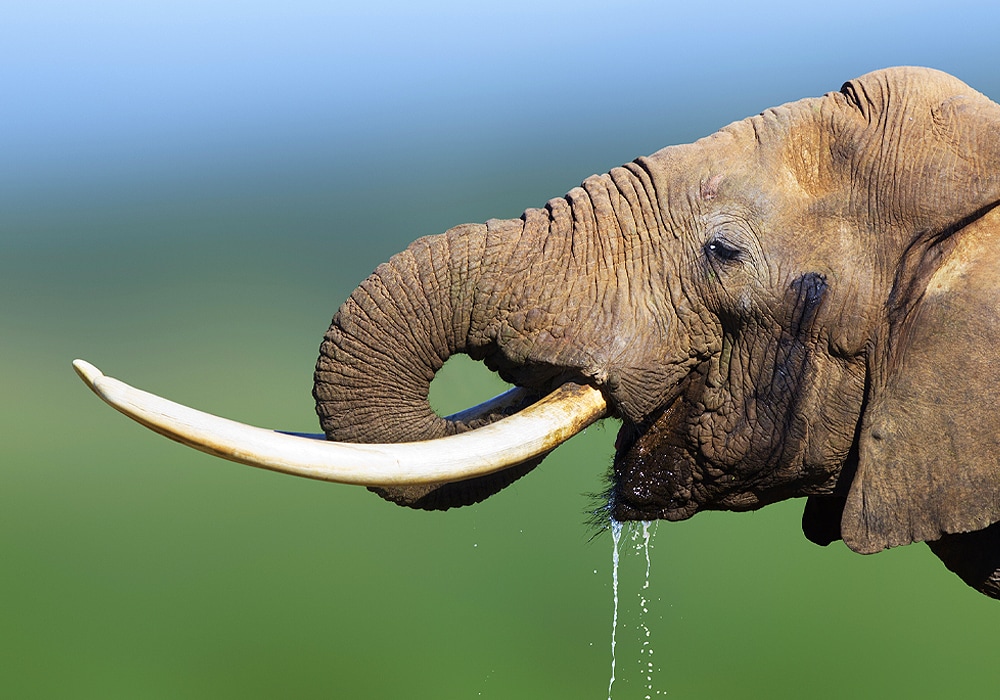
In India, the Elephant God is worshiped before the start of anything important or auspicious for this God is the destroyer of obstacles and clears the path to wealth, health, and prosperity.
In some parts of Europe, the elephant was a symbol of dullness and lethargy. In many Eastern countries, owing to their mammoth size, these animals were made to carry the royals. They played an important role in processions and palanquins.
Elephants also became the symbol of power, strength, and vitality. Owing to their round shape and grey color, they became representative of clouds. In some cultures, they were the caryatids of the Universe. (1)
Elephant Native American symbolism
Elephants did not exist in North America, but the tribes hunted large animals similar to the elephant, known as the mammoths. To most tribes, the large mammoth was a symbol of wisdom, good luck, strength, and power.
When a mammoth raised its trunk, it was considered a blessing. These large animals also became the symbol of strength, fertility, virility, and sexual energy. That is the reason why elephant or mammoth tusks were used in animal medicine and for healing.
The mammoths soon became extinct. The Native elders would often find bones and tusk of the wooly mammoth, which they used as remedies for sexual or reproductive problems.
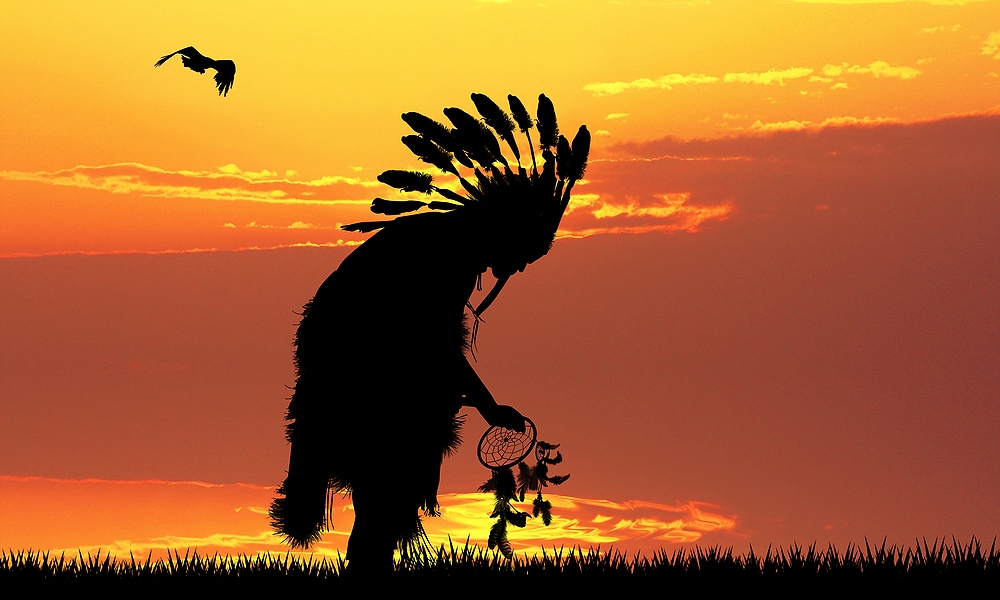
Just like deer antlers, bones, and tusks of these large other animals were worn as headdresses or jewelry. Finding tusks was considered to be good luck. The ivory found from walrus and elephants went into making jewelry or as gifts for deserving members of the tribes.
Sometimes, the Natives fashioned the bones and tusks into whistles and used them for hunting or even for gifting as symbols of peace. Elephant bones and ivory came to be useful in fighting many ailments.
The Cheyenne Indians made tea from a plant called Elephant’s Head (Pedicularis Groenlandica) to relieve coughing. These remedies were so beneficial that many Americans who used Native Indian tribes on expeditions started to rely on traditional medicine.
Elephant Eastern Symbolism
Asian elephant symbolism is very powerful. Elephants are revered as a symbol of good luck, prosperity, destroyer of evil, remover of obstacles, as well as strength, power, wisdom, memory, and vitality.
In India, there are millions of temples dedicated to the Elephant God, who has the head of an elephant and the body of a young boy. This God is the child of Shiva – the sustainer of the Universe. Elephant god figurines are placed in vehicles and gifted as house warming gifts to bring luck and positivity in the recipients’ lives.
The Japanese hadn’t seen elephants until the 16th Century. So, much of the elephant representation is based on the artists’ fantasy. In Shinto, elephants are portrayed alongside other large animals like leopards and dragons. The association may derive from makatsugyo, who is a part elephant and part crocodile and dolphin.
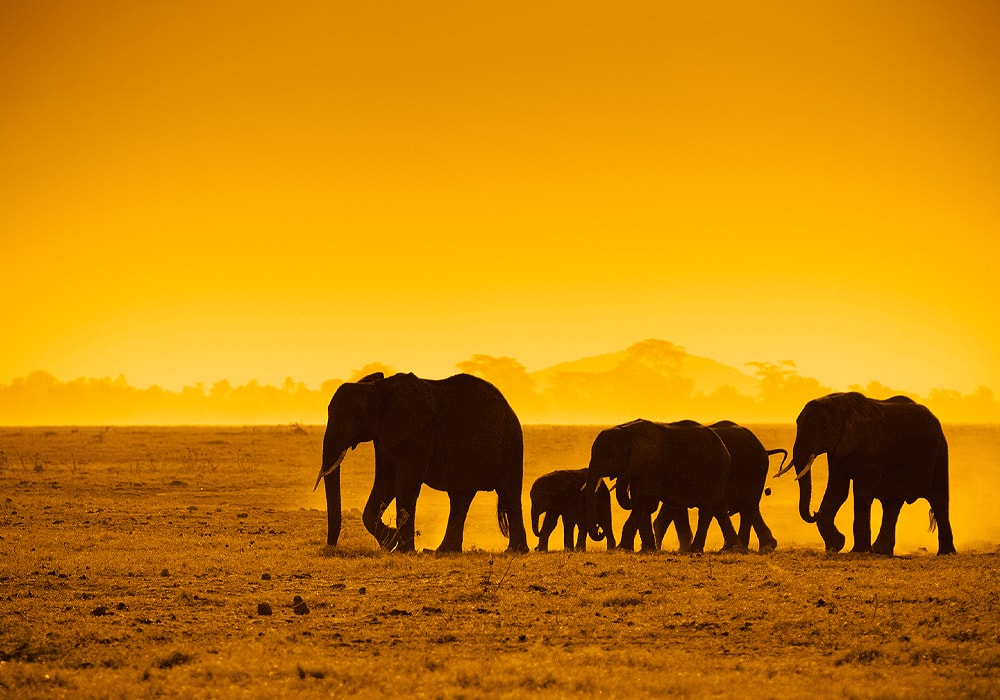
Because of the elephant’s association with water, the Japanese believe that the spiritual elephant figurines protect wooden structures against fires and also bring rain. (2)
In Chinese legends and mythology, the elephant symbolizes strength, wisdom, and prudence. The road that led to the palaces of Ming Emperors near Beijing is lined with large statues of elephants sitting and standing.
Childless women are known to place stones on the backs of these statutes with the belief that doing so can help them give birth to a son. The elephant is also sacred to Buddhists. Buddha elephant is seen in many art forms and Buddha’s mother, Maya, or Illusion is known to have dreams of a white elephant before His birth.
Elephant Christianity symbolism
Not only the thick skin but also his habits make the elephant a popular symbol in Christian art. Elephant in the Bible symbolizes the strength of prayer. In Noah’s Ark story, the elephants raid all of the Ark’s food supply and grow so fat that they threaten to tip the Ark over.
Noah prays to God and God answers him in his dream, asking him to tickle the hyena. This sets off a whole reaction, which ends up with the mouse hiding under the head of a cabbage.
When the elephants go to eat the cabbage, the mouse scares them as a result of which the elephants run to the opposite ends of the Ark, which restores the balance.
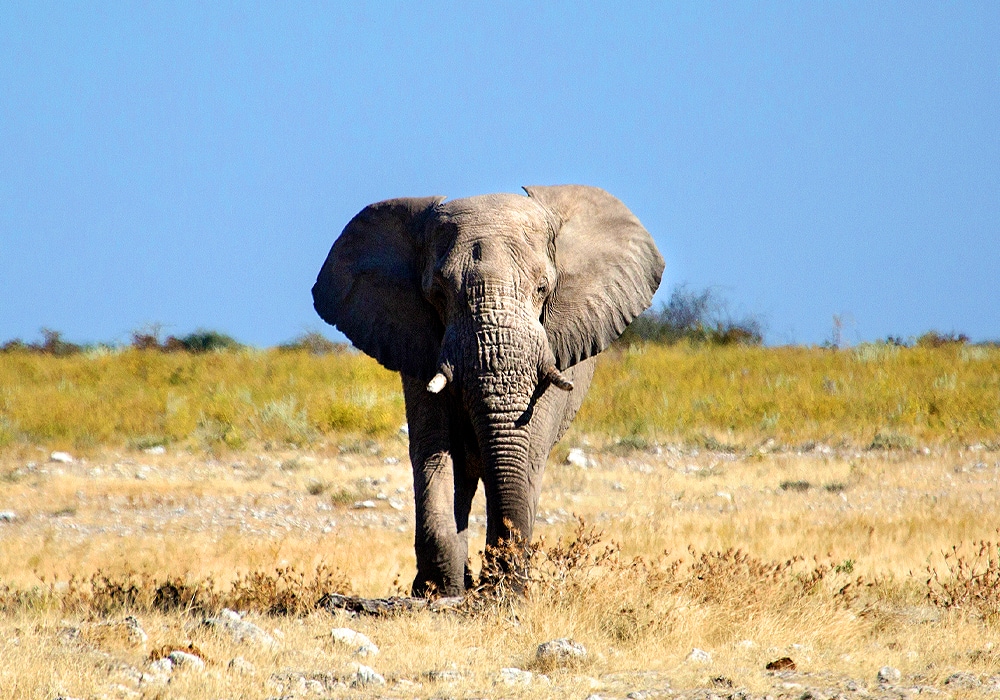
There is another story of Three Blind Men who touch different parts of the elephant. When asked to describe the elephant, one man says that the elephant is like a snake (he has touched the elephant’s tail), another says that it is flat like a fan (apparently he has been touching the elephant’s body), and another says that it is like a thick rope (the trunk).
Experts use this spiritual meaning of elephants to describe the vastness of God; He is too vast to be accurately described or defined by one religion or faith. The elephant symbolizes the vastness of God and also his all encompassing strength and love. (3)
Elephant African symbolism
In African elephant symbolism, elephants or mammoths came to symbolize sovereignty, war, royalty, and wisdom, as well as moral and spiritual strength.
African shamans believed elephants symbolize victory and triumph. An elephant draws the triumphal chariot of Fame personified. African Art of fabulous beasts always includes mammoths, elephants, and other large beasts.
The Tree of Life is usually depicted on elephant ivory, which is used in headdresses, jewelry, and artifacts. Many African tales exist about these beasts and in these, they are always linked with wisdom.
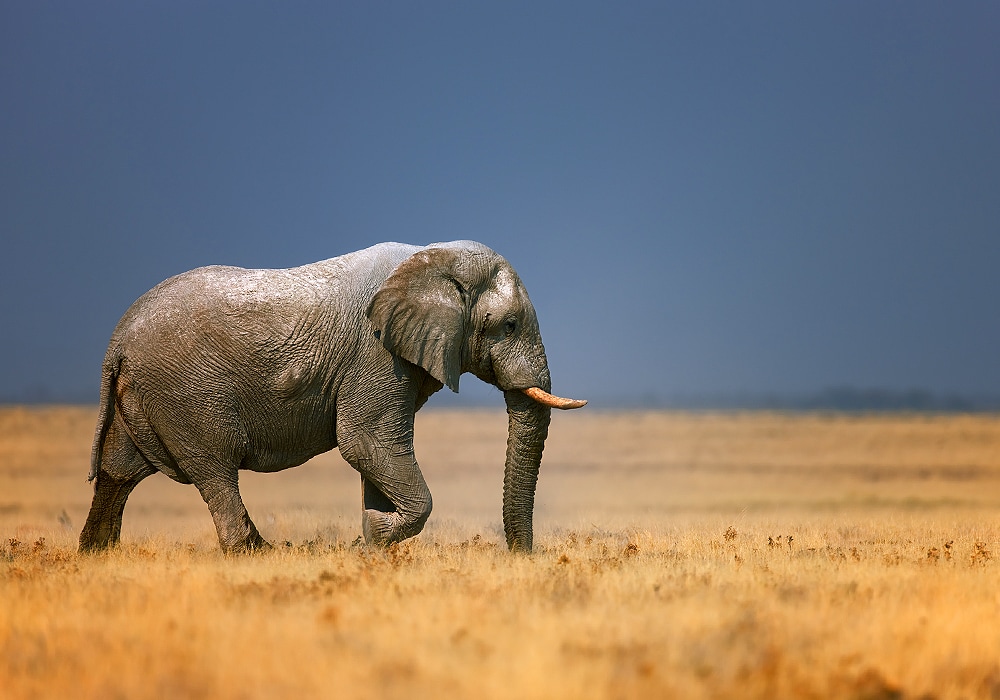
Elephants are thought to be the King of Animals as they often resolve disputes among other animals. Numerous tales exist about elephants shape-shifting into human form and vice versa.
Elephants, with their strong social bonds and family values, also have become the symbol of trust, loyalty, and family bonding in many African tales. After the Supreme God, Nzame created the Universe. He was asked to create a Supreme Chief to rule the animals.
Nzame decided to appoint the Elephant as one of the three animals to serve jointly in this position owing to its great Wisdom. Ashanti tribes of Ghana believe elephants to be reincarnations of human chiefs. For this reason, they give dead elephants proper burials. (4)
Elephant Medicine
Elephant medicine includes dignity, grace, strength, wisdom, confidence, patience, commitment, gentleness, discernment, intelligence, compassion, collective consciousness, and the removal of obstacles.
Call upon the elephant when you are about to start a new project, undertake a long journey, or simply when you are feeling anxious about the future.
You can chant the Lord Elephant’s name 108 times as they do in Indian culture or simply meditate upon this majestic beast. The elephant is a gentle giant. He is a vegetarian and never knowingly harms other animals. He believes in family and bonds and takes care of the young.
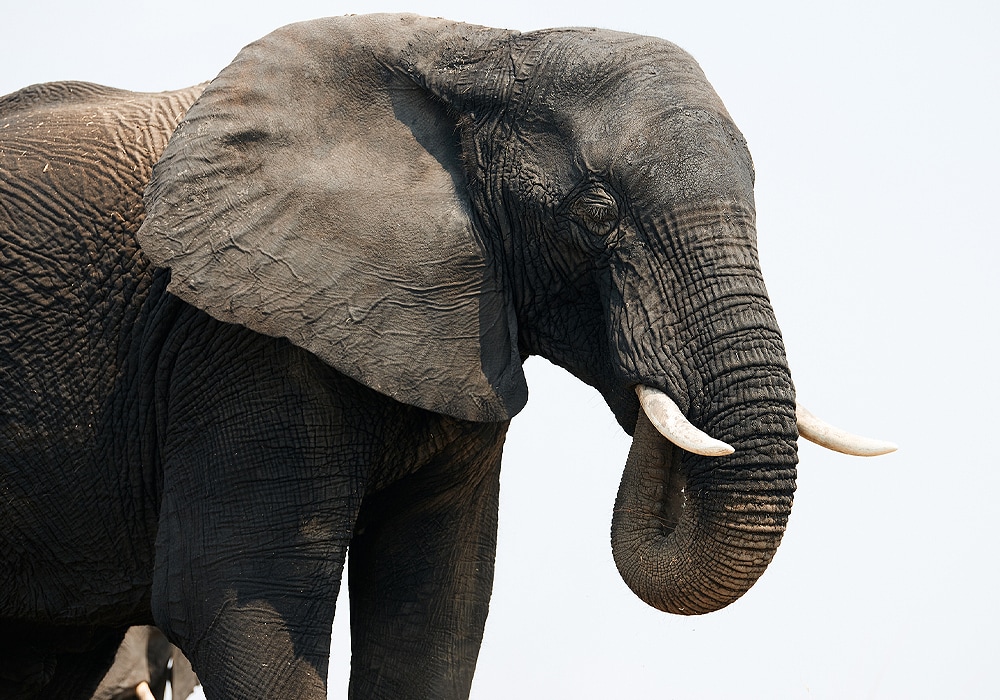
The young elephant is playful and often found frolicking in the mud. The elephant totem or elephant medicine will bring strength, power, courage, memory, good luck, happiness, bliss, and positivity in your new undertakings.
The Elephants’ massive head symbolizes the wisdom of the Universe while its trunk emanates the OM sound, which is one of the primordial sounds that occurred at the beginning of the Universe. The elephant medicine will bring you good luck, health, and positivity.
It will remove obstacles and also connect you to the wisdom of the collective consciousness. Be playful like the baby elephant and calm like the adult elephant. You can place a feng shui elephant in your home and car for good luck and prosperity. (5)
Elephant in dreams
Elephants in dreams meaning symbolizes wisdom, strength, and also good luck. They may also represent memory. Jung believed elephants to represent the self. The defensive nature of an elephant symbolizes introvert nature.
In Eastern cultures, dreaming of elephants is considered as good luck and removal of obstacles from one’s path. The Western representation isn’t too far off in that; a dream about elephants with trunk up means something positive is on the horizon.
In ancient American culture, the Natives believed that dreaming of dead elephants meant that the chief would die soon. In Africa, the elephant is considered a symbol of wisdom as well as good luck and he is considered the King of Animals.
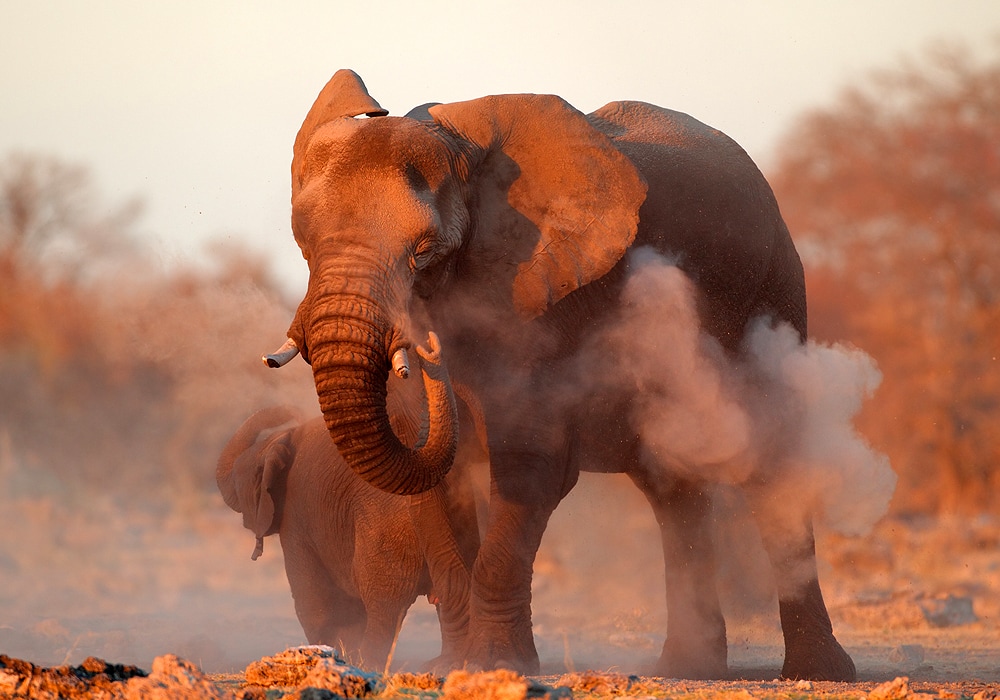
As a result, he amicably resolves disputes within his subjects. For this reason, elephants are believed to bring wisdom, peace, and resolution from long-standing disputes in the dreamer’s life. Baby elephant in dreams means you need to address your playful side.
Hebrews believed that if one dreams about an elephant wearing a saddle, then something wonderful is about to happen to him. And, if he dreams of several elephants, then wonder of wonders is about to happen.
At the same time, it is a bad sign to dream of an elephant without its saddle since the saddle represents its abundance. He who dreams of mounting an elephant will be revered.
Elephant encounters and omens
What do elephants represent? An elephant omen was mostly referred to during wars for the kings to get an idea about the outcome of the war.
Today, it is rare to encounter an elephant unless you visit a national park or zoo. A wailing elephant or elephant unsteady on its legs symbolizes a bad omen. It means bad luck or death in the near future.
An elephant passing blood in feces or urine or vomiting blood means that the king will die soon. The Native Indians believed that dreaming of a dead elephant was an omen that the chief would die soon.
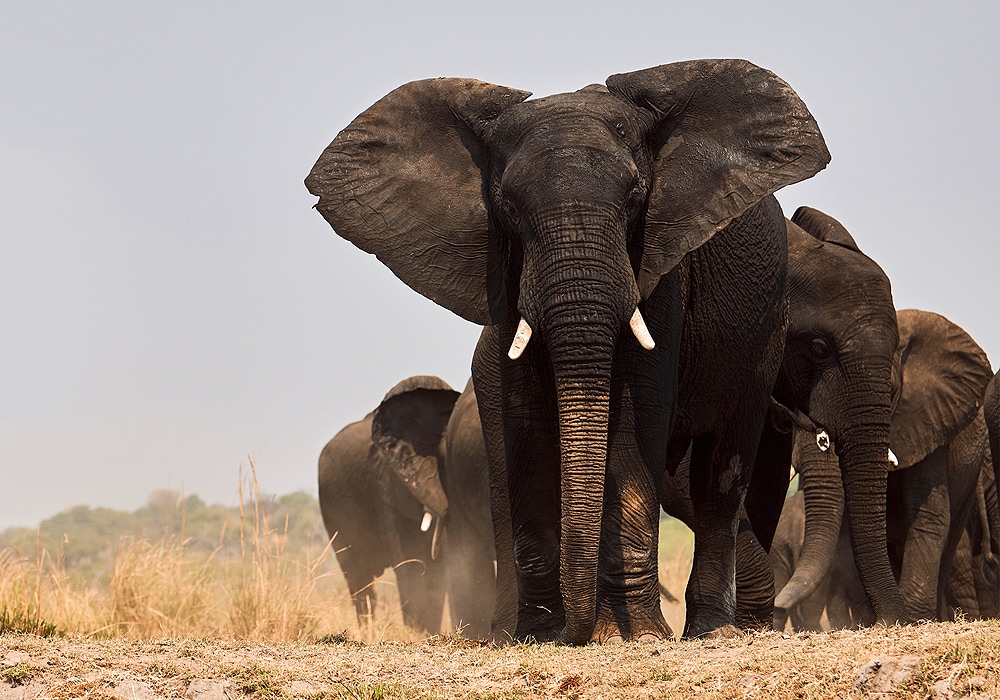
In India, if a king saw elephants and horses neighing, it symbolized that good luck would be on his side in war.
During the Great War of Mahabharata, Kauravas (who eventually were defeated in the war) saw the mixture of urine mixed with the semen of the elephant – which was a negative omen for them. Elephant trunk up is an omen of victory for the observer.
If, however, an elephant starts running without any reason, it meant that something bad was about to happen. Elephants tusks were often chopped for ivory. If, while sawing the tusk off, the owner saw a gleaming surface with a good fragrance, then it spelled prosperity for the owner. A broken or cracked tusk meant bad omen. (6)
Elephant mythology and folklore
In Burmese folklore, the water-elephant is a rare species of a small, tusked creature no larger than a mouse but strong enough to attack elephants and consume their brains; they live in the muddy and brackish water high up in the mountains.
In Hindu mythology, the elephant’s symbolism is spiritual, and the animal is given the status of a God. There are millions of temples or shrines for these Elephant headed Gods in India.
Some cultures believe that the Universe is supported by eight elephants, called Achtequedjams. The beast of burden of Indra, the favorite Vedic god, was an elephant that was produced by the churning of the primeval ocean.
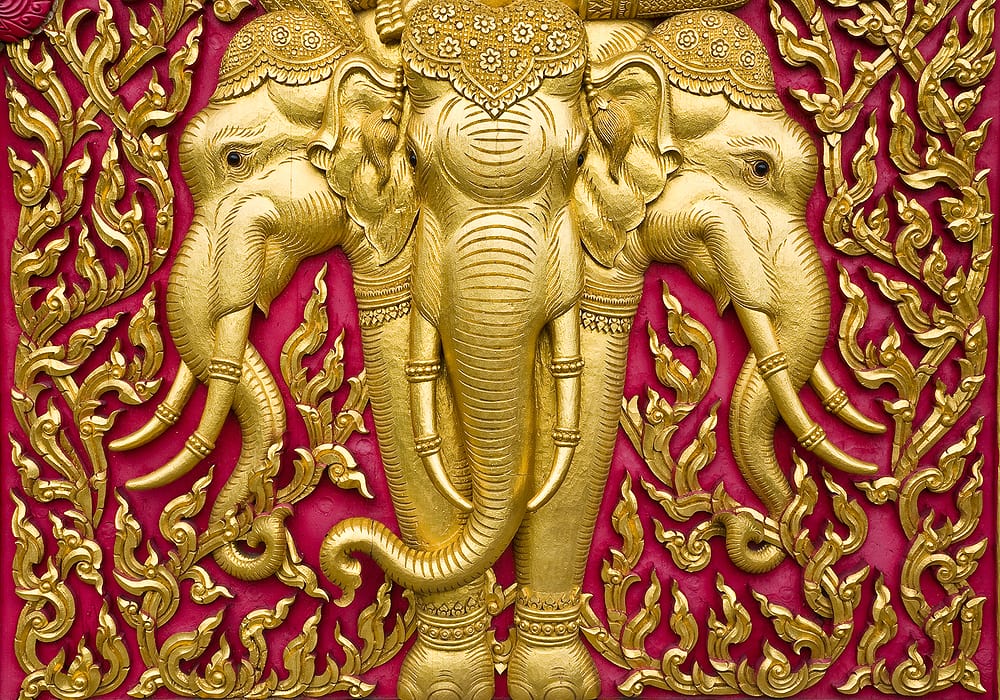
In Chinese legends and mythology, the elephant symbolizes strength, wisdom, and prudence. In Japan, a white elephant with blazing red eyes, face, and six tusks represents the reincarnation of Shakyamuni before he became the Buddha.
Baku (which is found in both Chinese and Japanese mythology) are “dream eaters,” having the head of an elephant and the body of a lion.
Many myths are told in Africa about this large animal whose extreme size makes it undisputable in nature, other than by man, who has weapons and magic to kill it. In African elephant mythology, this animal is always the King of Animals as it has the Wisdom and Strength to resolve disputes.
Elephant spirit animal
Elephant traits include patience, wisdom, strength, loyalty, and strong familial bonds. If an elephant spirit animal shows up, then it means you have these traits in you.
It also means that you are sensitive, nurture compassion, and value commitment. An elephant is steady, stable, gentle, and non-temperamental unless provoked.
He can resolve disputes amicably and is highly trainable. That is why these animals have always worked well alongside men. They are wise and have an excellent memory. It is believed that elephants can even remember their past life.
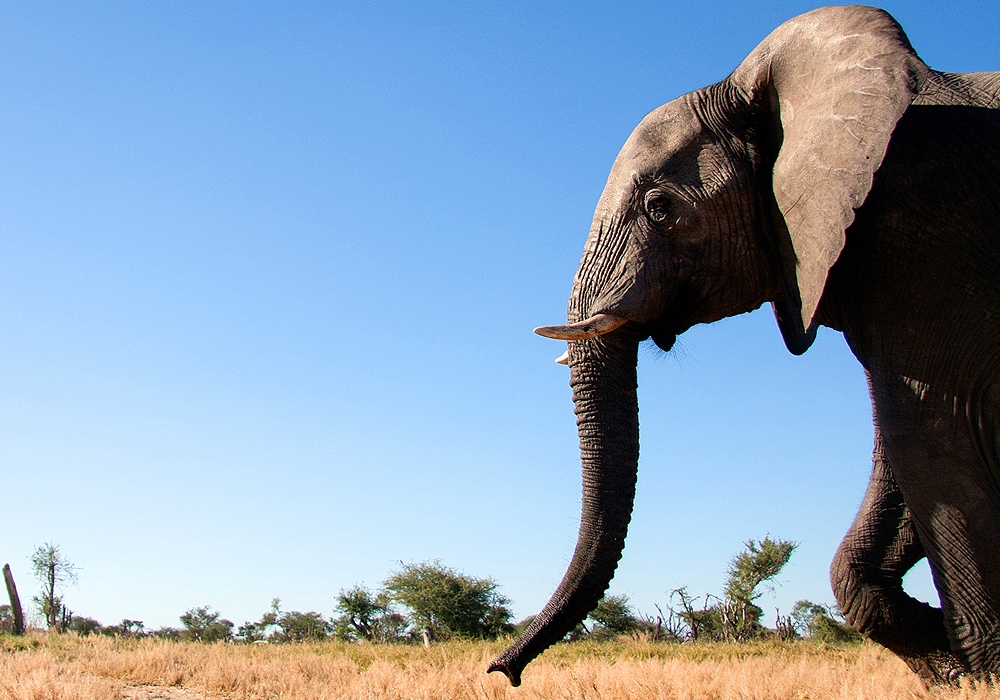
Elephants can make loyal and loving friends. They live in matriarchal groups and hence form close bonds. The elephant spirit animal teaches man to live in harmony with nature and form loving and close bonds.
Call upon the elephant when you want to heal deep trauma or unearth hidden memories. This gentle animal can display a wide range of emotions, including joy and sorrow. Through this, the elephant is asking you to get in touch with your feelings and follow your instincts as well.
If you are feeling angry about a past issue, the elephant is asking you to discover the more vulnerable feelings behind that anger. Through this, the elephant is asking you to forgive and be gentle with others. (7)
Elephant totem animal
Elephant totem animal’s message to you is that it is your sacred task to honor, protect, and defend that part of you which is connected to the Divine.
You can call this inner part your Queen or King – just like this mighty beast is the King of the Animals. This sovereign aspect of you is deeply rooted in ancient wisdom.
The best way to access the elephant’s power is to meditate upon this animal. You can place feng shui elephant figurines or the idol of the Indian elephant God Ganesha in your room. Burn some incense sticks of sandalwood to deepen your meditation.
This will help you invoke the elephant’s qualities like loyalty, wisdom, kindness, and intelligence. The elephant is your connection to the Higher Realm.
Through this animal, you can connect with your spirit guides and angels. The elephant is also asking you to be loving and gentle to others. If possible, volunteer your time at an old age home, hospice, or children’s home.
Elephant totem animal symbolizes luck, prosperity, removal of obstacles, wisdom, and good omens. Your family and loved ones need you. You must protect them. Strong familial ties are the backbone of your relationship with the elephant. (8)
Elephant power animal
As a power animal, the elephant furthers compassion, patience, and kindness and may help us to remember our lessons.
The elephant is also strength, power, wisdom, loyalty, patience, kindness, and perseverance. Ganesha – the Hindu Elephant God’s name is derived from Sanskrit Gana-isha, meaning lord of a multitude in the sense of the heavenly host for the lost, needy, and poor.
Buddha’s birth was predicted to his mother Maya in the form of the dream of a white elephant. You will know if the elephant is your power animal if it appears to you in your dreams.
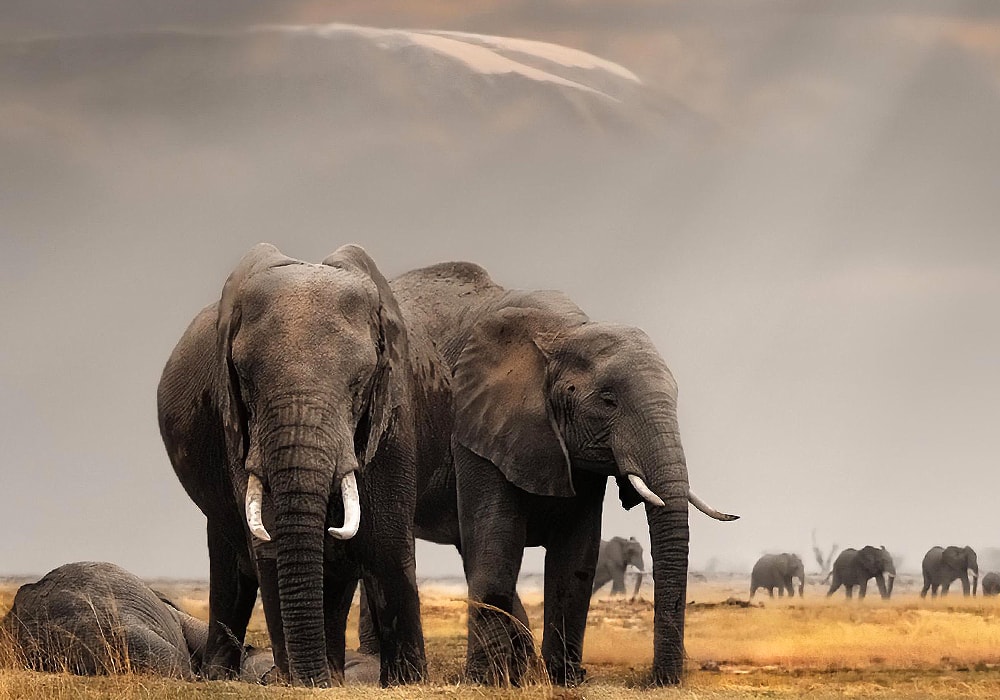
Consider the elephant as your ally, the natural gatekeeper, or guide that is trying to help you in all its myriad forms. If you need a lift over a chasm, call upon this power animal. He will help you tide over obstacles.
Also, worship this power animal by saying his name in meditation twice a day. The elephant wants you to have faith that you can rise over anything and everything. So keep your playfulness and happy nature intact.
When you meditate, ask your elephant power animal to accompany you. When you end your meditation, take its leave but ask him to accompany you on all your journeys. Before you begin a new project, seek the blessings of this Divine animal. (9)
Elephant tattoo meaning
What do elephants symbolize as a tattoo? Elephant tattoo meaning will change based on the location you are in as well as the tattoo depiction itself.
You can simply go in for an elephant tattoo if you like this animal or try to convey a deeper elephant symbolism of loyalty, strength, power, wisdom, divinity, familial ties, and virility. In the West, the elephant is a symbol of obesity.
Go to the east and the elephant tattoo meaning will be more spiritual and sacred. The Hindus worship the Elephant God- Lord Ganesha – which has become the most popular elephant symbol in many parts of the world now.

The elephant tattoo of Lord Ganesha represents destruction of evil, helper of the weak, remover of obstacles, and, in general, blessings, good luck, and positivity.
Too many poor people in the East, the elephant-God is a symbol of hope, abundance, and prosperity. For students, the elephant tattoo can symbolize good memory, deeper connections with the divine, and good luck for exams and the future.
As you can see, there are many different meanings as far as elephant tattoo is concerned. So, discuss your vision with an experienced tattoo artist so you can get the exact tattoo of your dreams.
Conclusion
Elephants symbolize inner strength and wisdom. They may also represent memory. Jung believed elephant symbolism is connected to the self. The defensive nature of an elephant may represent an introverted nature. Whether you have been seeing elephants in your dreams or wish to get an elephant tattoo, we hope this guide helps you decipher your own special elephant meaning.
Related:

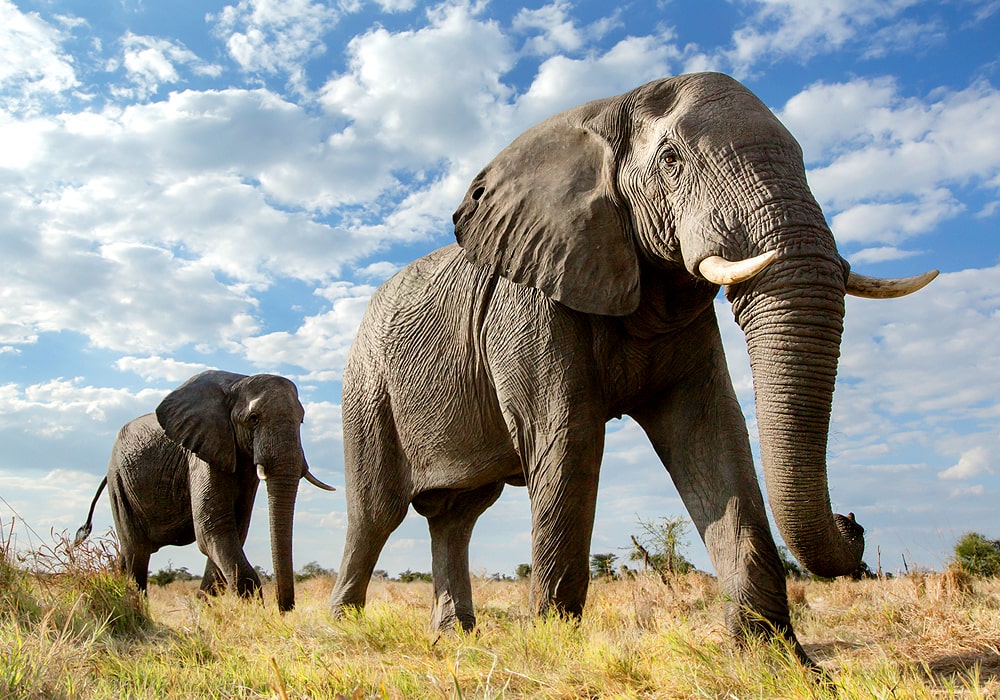
Hi Garth
Thank you for your article. Sadly your information about Christians and elephants seems incorrect. Elephants are indeed beautiful creatures, part of Gods magnificent creation and are to be admired as representing His strength and tenderness, a weird but beautiful combo but having read the Bible through a few times now I find no stories similar to what you shared.
Peace
In my dream, I saw a huge elephant raising it horn on a leave , it really huge and the elephant was hold, shining very well. I was admiring it then I was like waw what an animal. At the same time, I was talking to myself that am fortunate to see an elephant close to me like this. Later someone came , then the elephant ran away. Immediately I woke up from sleep n realized that it was 4:30 to 5:am in the morning.
In my dream it was a baby elephant with two heads and two tails, I brought it outside to play and it just collapsed and died on the ground. What could that mean?
Wonderful, comprehensive and insightful.
This was deep, beautiful, and insightful. Thank you 🙏🏾